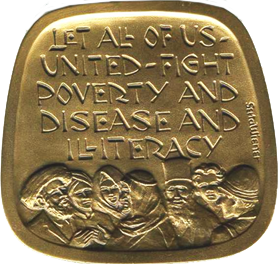 |  |
Golda Meir medal designed by Gerta Ries Wiener, struck by Roger Williams Mint in quantities of 465 bronze, 245 pure silver and 25 14kt gold. Obverse: Portrait, IN HONOR OF HER 80 • BIRTHDAY MAY 3 1978 • Golda Meir (signature. Reverse: Group of men and women of different religions and sects living in Israel, LET ALL OF US — UNITED — FIGHT POVERTY AND DISEASE AND ILLITERACY, Gerta Wiener. 47 x 45 mm.
Born in Kiev, Russia, Golda Mabovitch’s (later Meir) family emigrated to the United States, settling in Milwaukee in 1906. From the time, at the age of ten, that she organized the American Young Sisters’ Society to provide textbooks for the needy school children, Golda dedicated her life to solving the problems of others.
An avowed Zionist since she settled in a kibbutz in Palestine with her husband, Morris Myerson, in 1921, Golda soon became involved in political activities. She served as an emissary to the Pioneer Women’s Organization in the United States from 1932-4, and after her return to Palestine, joined the Executive Committee of the Histadrut, the General Federation of Israel Labor. Golda soon rose to become head of Histadrut’s Political Department, and in 1946 served in the same role for the Jewish Agency until the establishment of the State of Israel two years later. Golda’s perilous secret meeting with King Abdul-lah of Jordan, just before the Arab invasion was a dramatic attempt for last minute conciliation.
David Ben-Gurion appointed Golda Meir as Minister to Moscow, and in 1949 she became Minister of Labor. She initiated large scale housing and road-building programs, and vigorously supported the policy of unrestricted immigration.
It was not until Golda was appointed Foreign Minister, that she Hebraized her last name to Meir, at the behest of Ben-Gurion. As Foreign Minister (1956-1965), Golda was often Israel’s spokesperson at the United Nations, where she pleaded for all of those who call the Holy Land home to “united, fight poverty and disease and illiteracy.”
After the death of Levi Eshkol in 1969, Golda Meir became the fourth Prime Minister of Israel. Originally thought to have been a stop-gap appointment, she went on to lead her party to victory in the next election, and continued to carry on indirect negotiations with Egypt through the outbreak of the Yom Kippur War in 1973. Despite her eminence, she was called simply “Golda” to everyone in Israel and on her frequent travels around the world.